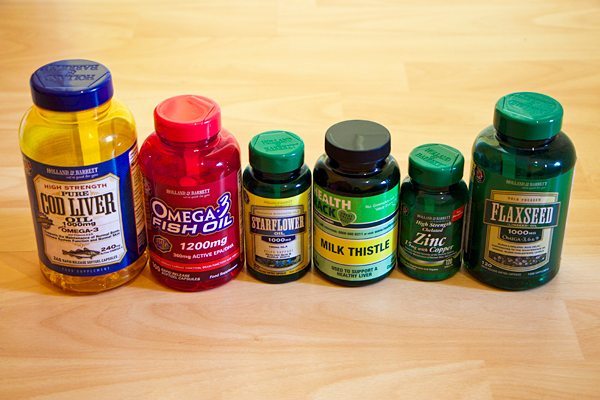Acne, especially the persistent, often hormonal kind, is a common skin issue that affects people across various age groups. While countless factors contribute to acne development, hormonal imbalances stand out as a significant trigger, particularly in adult acne cases.
Hormonal acne occurs due to fluctuations in hormone levels, specifically androgens like testosterone, which stimulate the skin’s oil glands. This surge in oil production can lead to clogged pores, inflammation, and the dreaded breakouts. Contrary to popular belief, hormonal acne isn’t confined to adolescence; it can persist well into adulthood, causing frustration and self-esteem issues for many.
Amidst numerous acne treatments available, the potential of vitamins in addressing hormonal acne has garnered attention. These essential nutrients play pivotal roles in regulating bodily functions, including those linked to skin health. Vitamins can modulate sebum production, combat inflammation, promote skin healing, and even contribute to hormonal balance, making them crucial allies in the fight against acne.
In this comprehensive guide, we’ll delve into the 10 powerhouse vitamins that have shown promise in managing hormonal acne. From the renowned Vitamin A, known for its ability to regulate sebum production, to Vitamin E’s antioxidant prowess in reducing inflammation and scarring, each of these vitamins offers unique benefits for clearer, healthier skin.
Recommended: Can I Take Magnesium While Breastfeeding?
Understanding how these vitamins interact with hormonal balance and skin health can provide valuable insights into crafting an effective strategy for managing hormonal acne. Whether through dietary adjustments, supplementation, or a combination of both, unlocking the potential of these vitamins could be the key to achieving smoother, blemish-free skin.
What Is Hormonal Acne?
Hormonal acne is a type of acne that’s primarily triggered by hormonal fluctuations in the body. It’s often associated with increased androgen levels, which can stimulate the skin’s oil glands, leading to excess oil production. This excess oil, along with dead skin cells, can clog pores and create an environment where bacteria thrive, resulting in acne.
Hormonal acne tends to appear predominantly in certain areas, such as the lower part of the face – chin, jawline, and sometimes the neck and back. It can manifest as deeper, more tender nodules or cysts compared to regular acne, and it often flares up during specific times in a person’s hormonal cycle, such as menstruation or puberty.
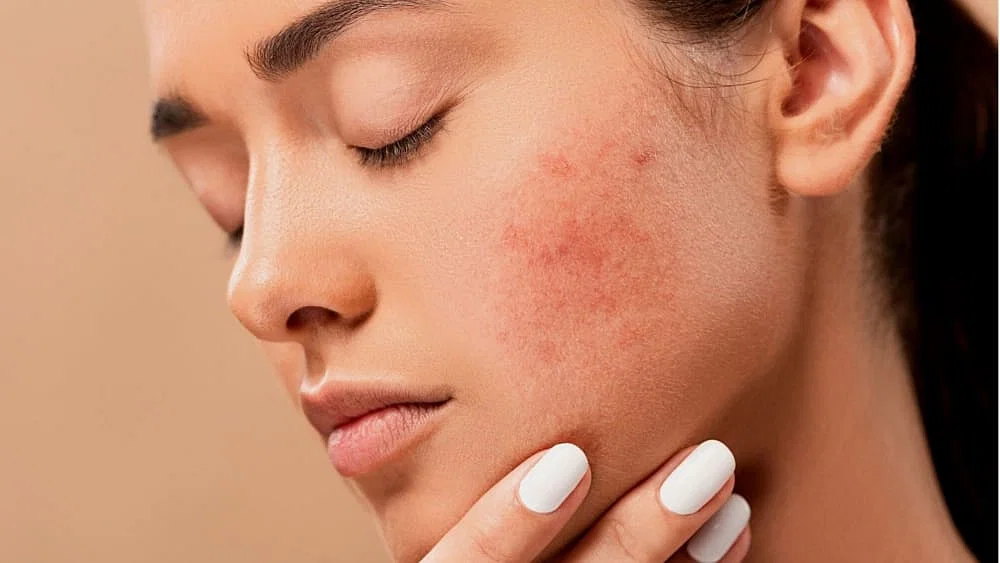
Treatment for hormonal acne may involve a combination of topical treatments (like retinoids or benzoyl peroxide), oral medications (such as birth control pills or spironolactone), lifestyle changes, and sometimes medical procedures based on the severity and individual response to treatments. Consulting with a dermatologist is often helpful in determining the most effective approach for managing hormonal acne.
Recommended: Does Magnesium Affect Breast Milk Production?
Top 10 Vitamins For Hormonal Acne
1. Vitamin A: The Skin Renewer
Vitamin A is a potent micronutrient renowned for its pivotal role in maintaining healthy skin. Its derivative compounds, such as retinoids and carotenoids, contribute significantly to various aspects of skin health, including cell growth, repair, and immunity.
How Vitamin A Regulates Sebum Production
One of the key mechanisms through which Vitamin A impacts hormonal acne is its ability to regulate sebum production. Sebum, the oily substance produced by the skin’s sebaceous glands, is essential for skin lubrication.
However, excess sebum can lead to clogged pores, fostering the ideal environment for acne-causing bacteria to thrive. Vitamin A helps control sebum production, preventing pores from becoming congested and reducing the likelihood of acne breakouts.
Food Sources and Supplement Options
- Food Sources: Incorporating Vitamin A-rich foods into your diet can aid in managing hormonal acne. Foods such as carrots, sweet potatoes, spinach, kale, and liver are excellent natural sources of Vitamin A. These foods provide not only Vitamin A but also other essential nutrients that promote overall skin health.
- Supplements: In some cases, supplementation might be necessary to ensure adequate intake of Vitamin A. However, it’s essential to consult a healthcare professional before starting any supplementation regimen, as excessive Vitamin A intake can have adverse effects.

Topical Applications
Apart from dietary intake and supplementation, topical retinoids derived from Vitamin A derivatives are often prescribed by dermatologists to treat acne. These compounds, such as tretinoin and adapalene, work by unclogging pores, promoting cell turnover, and reducing inflammation, ultimately leading to clearer skin.
Precautions and Considerations
While Vitamin A offers promising benefits for managing hormonal acne, it’s crucial to strike a balance in its intake. Excessive Vitamin A consumption, whether through supplements or highly concentrated topical treatments, can lead to adverse effects such as dry skin, irritation, and even liver toxicity. Therefore, it’s advisable to follow recommended dosages and consult a healthcare professional for guidance tailored to individual needs.
Recommended: Can You Drink Gatorade While Pregnant?
Vitamin A’s role in regulating sebum production and supporting overall skin health makes it a valuable asset in combating hormonal acne. Whether obtained through a balanced diet rich in Vitamin A sources or cautiously supplemented under professional guidance, leveraging the benefits of Vitamin A can contribute significantly to achieving clearer, blemish-free skin.
2. Vitamin E: The Healing Agent
Vitamin E, a fat-soluble antioxidant, plays a crucial role in protecting cells from oxidative stress caused by free radicals. This vitamin’s antioxidant properties contribute significantly to overall skin health by neutralizing free radicals, which can damage skin cells, exacerbate inflammation, and contribute to acne development.
Inflammation is a common feature of acne, and Vitamin E’s anti-inflammatory properties can help mitigate this aspect. By reducing inflammation, Vitamin E may aid in calming existing acne lesions and minimizing the risk of scarring, allowing the skin to heal more effectively.
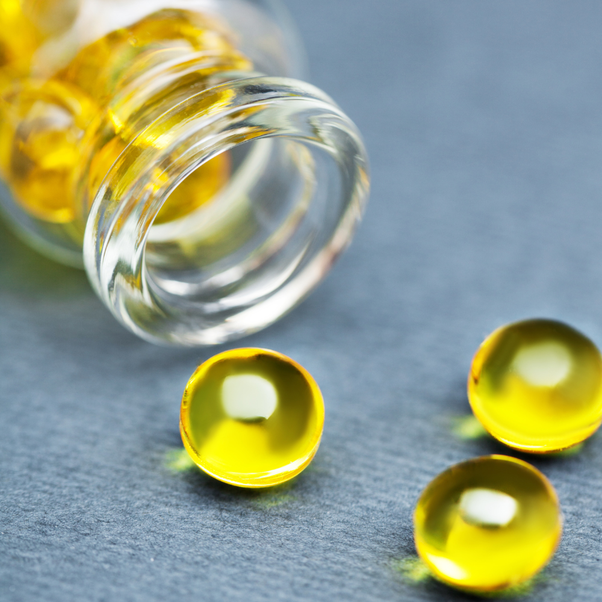
Recommended Dosage and Food Sources
- Dosage: The recommended dietary allowance (RDA) for Vitamin E is around 15 mg per day for adults. However, higher doses may be recommended for specific conditions under medical supervision.
- Food Sources: Including Vitamin E-rich foods in your diet can support your skin health. Nuts (such as almonds and sunflower seeds), spinach, avocado, and vegetable oils (like sunflower or safflower oil) are excellent sources of Vitamin E.
Supplement Considerations
While obtaining Vitamin E through diet is preferable, supplements might be considered if dietary intake is insufficient. However, it’s crucial to consult a healthcare professional before starting any supplementation to ensure appropriate dosage and avoid potential interactions with other medications or supplements.
Topical Application
In addition to oral consumption, topical application of Vitamin E oil or creams is often recommended to promote skin healing and reduce acne scarring. Its moisturizing properties can help soothe and nourish the skin, potentially aiding in the recovery process from acne breakouts.
Precautions and Considerations
Although Vitamin E offers numerous benefits for skin health, excessive intake through supplements may lead to adverse effects such as gastrointestinal issues or interference with blood clotting mechanisms. It’s crucial to adhere to recommended dosages and seek professional guidance to ensure safe and effective use.
Recommended: Can a Woman Have an Orgasm After Menopause?
Vitamin E’s antioxidant and anti-inflammatory properties make it a valuable component in managing hormonal acne. Whether obtained through a balanced diet rich in Vitamin E sources or applied topically to aid in skin healing, leveraging the potential benefits of this vitamin can contribute to achieving clearer, healthier skin while minimizing acne-related inflammation and scarring.
3. Vitamin C: The Antioxidant Defender
Vitamin C, also known as ascorbic acid, is a powerhouse antioxidant that plays a pivotal role in collagen synthesis. Collagen, a structural protein, is crucial for maintaining skin elasticity and promoting wound healing. Vitamin C’s involvement in collagen production aids in repairing damaged skin tissues, potentially minimizing acne scars and supporting overall skin health.
Anti-inflammatory Effects on Acne
Inflammation is a common denominator in acne development, and Vitamin C’s potent anti-inflammatory properties can help alleviate this concern. By reducing inflammation, Vitamin C may contribute to calming existing acne lesions, preventing further irritation, and supporting the skin’s healing process.

Recommended Dosage and Food Sources
- Dosage: The recommended daily intake of Vitamin C for adults is around 75-90 mg for women and men, respectively. However, higher doses may be suggested in certain situations, such as during periods of increased oxidative stress or skin repair.
- Food Sources: Incorporating Vitamin C-rich foods into your diet can bolster skin health. Citrus fruits like oranges, strawberries, kiwi, as well as bell peppers, broccoli, and leafy greens, are excellent sources of Vitamin C.
Supplement Considerations
While obtaining Vitamin C through a balanced diet is ideal, supplements might be beneficial, especially for individuals with inadequate dietary intake or specific health conditions. However, consulting a healthcare professional is crucial to determine the appropriate dosage and form of supplementation.
Topical Application
Topical Vitamin C serums have gained popularity for their potential to address acne-prone skin. These serums, containing stabilized forms of Vitamin C, can be applied directly to the skin, potentially reducing inflammation, promoting skin brightening, and aiding in the healing of acne-related blemishes.
Precautions and Considerations
While Vitamin C is generally considered safe, excessive intake through supplements might lead to gastrointestinal discomfort or diarrhea in some individuals. Additionally, those with sensitive skin might experience mild irritation with topical Vitamin C applications. Thus, moderation and patch tests are advisable.
Recommended: Can a Woman Have an Orgasm After Menopause?
Vitamin C’s multifaceted benefits, including its role in collagen synthesis, anti-inflammatory properties, and potential for skin brightening, make it a valuable ally in managing hormonal acne. Whether consumed through Vitamin C-rich foods, supplemented under guidance or applied topically for targeted skin benefits, harnessing the potential of Vitamin C can contribute significantly to achieving clearer, healthier skin while aiding in the reduction of acne-related inflammation and scarring.
4. Vitamin D: Regulating Sebum Production
Vitamin D, often referred to as the “sunshine vitamin,” plays a crucial role in maintaining hormonal balance within the body. It influences various hormonal pathways, including those related to the skin. Adequate levels of Vitamin D are believed to help regulate hormone production, potentially contributing to a reduction in hormonal imbalances that trigger acne.
Connection Between Vitamin D Deficiency and Acne
Studies have suggested a link between Vitamin D deficiency and the prevalence of acne. Low levels of Vitamin D may disrupt hormonal equilibrium, leading to increased sebum production and inflammation, which are primary contributors to acne development. Ensuring sufficient Vitamin D levels might help mitigate these factors and potentially alleviate hormonal acne symptoms.
Sun Exposure vs. Supplementation
- Sun Exposure: The most natural way to obtain Vitamin D is through exposure to sunlight. However, moderation is key as excessive sun exposure can lead to skin damage and increase the risk of skin cancer. Aim for safe sun exposure while using sunscreen to protect the skin.
- Supplementation: In cases where adequate sun exposure is challenging or insufficient for maintaining optimal Vitamin D levels, supplementation might be necessary. Consulting a healthcare professional for guidance on appropriate dosages and supplementation is advisable.

Dietary Sources and Considerations
While Vitamin D is not abundantly present in most foods, some dietary sources can contribute to its intake. Fatty fish like salmon, fortified dairy products, egg yolks, and certain mushrooms contain varying amounts of Vitamin D and can be included in the diet to support overall skin health.
Importance of Vitamin D Levels in Acne Management
Maintaining optimal Vitamin D levels is crucial not only for skin health but also for overall well-being. While more research is needed to establish a definitive link between Vitamin D and acne, ensuring adequate levels through a combination of safe sun exposure, dietary intake, and supplementation when necessary may positively impact hormonal balance and, subsequently, help manage hormonal acne.
Recommended: Does Ovulation Make You Emotional?
Vitamin D’s influence on hormonal balance and its potential impact on acne make it a compelling factor in skin health. Whether obtained through safe sun exposure, dietary sources, or supplementation under professional guidance, optimizing Vitamin D levels can contribute to maintaining hormonal equilibrium and supporting clearer, healthier skin by potentially reducing acne symptoms associated with hormonal imbalances.
5. Vitamin B Complex: Balancing Hormones Naturally
The Vitamin B complex comprises a group of water-soluble vitamins that play crucial roles in various bodily functions, including skin health. Certain B vitamins, particularly B5 (pantothenic acid), B6 (pyridoxine), and B12 (cobalamin) have garnered attention for their potential influence on hormonal balance and skin conditions, including acne.
Regulation of Hormonal Imbalance
- Vitamin B5 (Pantothenic Acid): This vitamin is involved in the metabolism of fats and carbohydrates and has been studied for its potential to reduce sebum production. By modulating sebum production, B5 may help prevent pores from becoming clogged, potentially reducing acne breakouts.
- Vitamin B6 (Pyridoxine): B6 is involved in hormone regulation and may play a role in alleviating hormonal acne by regulating hormone levels, particularly androgens like testosterone, which can contribute to increased sebum production.
- Vitamin B12 (Cobalamin): While essential for numerous bodily functions, excess B12 intake has been associated with acne development. However, more research is needed to establish a definitive link between Vitamin B12 and acne.
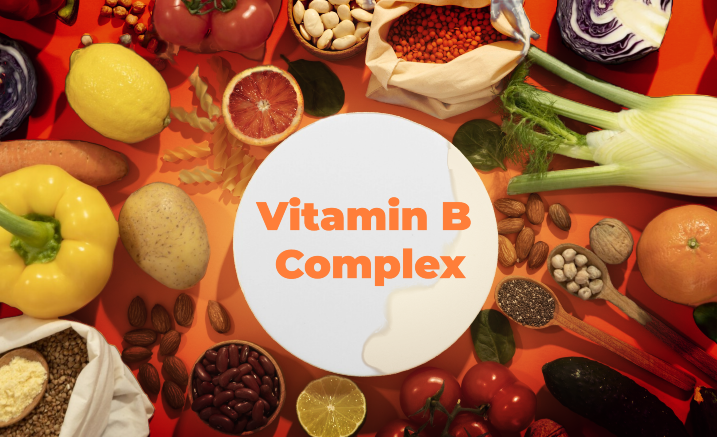
Foods Rich in B Vitamins
Incorporating foods rich in B vitamins into your diet can support skin health and potentially aid in managing hormonal acne:
- Vitamin B5 Sources: Whole grains, legumes, meat, and avocados.
- Vitamin B6 Sources: Chickpeas, fish, poultry, and bananas.
- Vitamin B12 Sources: Fish, meat, dairy, and fortified cereals.
Supplementation and Considerations
While a balanced diet typically provides adequate B vitamin intake, supplementation might be considered in cases of deficiency or specific health conditions. However, it’s crucial to consult a healthcare professional to determine the need for supplementation and appropriate dosages.
Importance of B Vitamins in Hormonal Acne Management
B vitamins’ involvement in hormone regulation and metabolic processes underscores their potential impact on hormonal acne. Incorporating these vitamins through a balanced diet rich in B vitamin sources or targeted supplementation under professional guidance may contribute to maintaining hormonal balance and supporting healthier skin.
Recommended: How To Get Rid Of Smelly Discharge During Pregnancy
The diverse roles of B vitamins, particularly B5, B6, and B12, in regulating hormones and supporting skin health highlight their relevance in managing hormonal acne. Whether obtained through dietary sources or supplemented cautiously, leveraging the potential benefits of B vitamins can aid in promoting clearer, healthier skin by potentially modulating hormonal imbalances associated with acne development.
6. Zinc: Regulating Hormonal Balance
Zinc is an essential mineral that plays a crucial role in various physiological processes, including immune function, cell growth, and hormone regulation. Its potential role in managing hormonal acne stems from its ability to modulate hormone levels, particularly androgens, which can influence sebum production.
Reduction of Inflammation and Oil Production
- Anti-Inflammatory Properties: Zinc exhibits anti-inflammatory effects, potentially reducing acne-related inflammation. By controlling the body’s inflammatory responses, zinc may aid in calming existing acne lesions and preventing the formation of new ones.
- Regulation of Sebum Production: Excess sebum production is a primary factor in acne development. Zinc helps regulate sebum production, potentially preventing pores from becoming clogged and reducing the likelihood of acne breakouts.
Dosage, Side Effects, and Food Sources
- Recommended Dosage: The recommended daily intake of zinc varies, but for adults, it typically ranges from 8 to 11 mg, depending on gender and specific health conditions. Higher doses may be recommended under professional guidance for acne management.
- Side Effects: While zinc is generally safe when taken within recommended limits, excessive intake can lead to adverse effects such as nausea, digestive issues, and interference with other mineral absorption. Therefore, moderation is key.
- Food Sources: Zinc can be obtained through various dietary sources, including shellfish (like oysters), red meat, poultry, beans, nuts, seeds, and dairy products.

Supplement Considerations
In cases where dietary intake is insufficient or for individuals with specific health conditions, zinc supplementation might be considered. However, it’s crucial to consult a healthcare professional to determine the need for supplementation and appropriate dosages to avoid potential side effects or interactions with other medications.
Importance of Zinc in Acne Management
Zinc’s multifaceted effects on hormone regulation, inflammation reduction, and sebum production control highlight its potential significance in managing hormonal acne. Whether obtained through dietary sources or cautiously supplemented, optimizing zinc intake can potentially contribute to achieving clearer, healthier skin by addressing factors associated with acne development.
Recommended: Does Blue Cross Blue Shield Cover Testosterone Treatment?
Zinc’s role in regulating hormones, reducing inflammation, and controlling sebum production positions it as a valuable asset in combating hormonal acne. Whether incorporated through a balanced diet rich in zinc sources or supplemented judiciously, leveraging the potential benefits of zinc can aid in promoting clearer, healthier skin by potentially addressing key factors contributing to acne.
7. Omega-3 Fatty Acids: Taming Inflammation
Omega-3 fatty acids, notably EPA (eicosapentaenoic acid) and DHA (docosahexaenoic acid), are essential polyunsaturated fats with numerous health benefits, including their impact on skin health. These fatty acids are known for their anti-inflammatory properties and their role in maintaining the integrity and function of cell membranes.
Reduction of Inflammatory Responses
- Anti-Inflammatory Effects: Omega-3 fatty acids exhibit potent anti-inflammatory effects within the body. By modulating inflammatory pathways, these fatty acids can potentially reduce the inflammatory responses associated with acne, calming redness and swelling.
- Balancing Omega-6 to Omega-3 Ratio: Achieving a balanced ratio of omega-6 to omega-3 fatty acids is crucial. In Western diets, the imbalance often leans towards higher omega-6 intake, which can promote inflammation. Increasing omega-3 intake can help restore this balance and mitigate inflammatory processes.
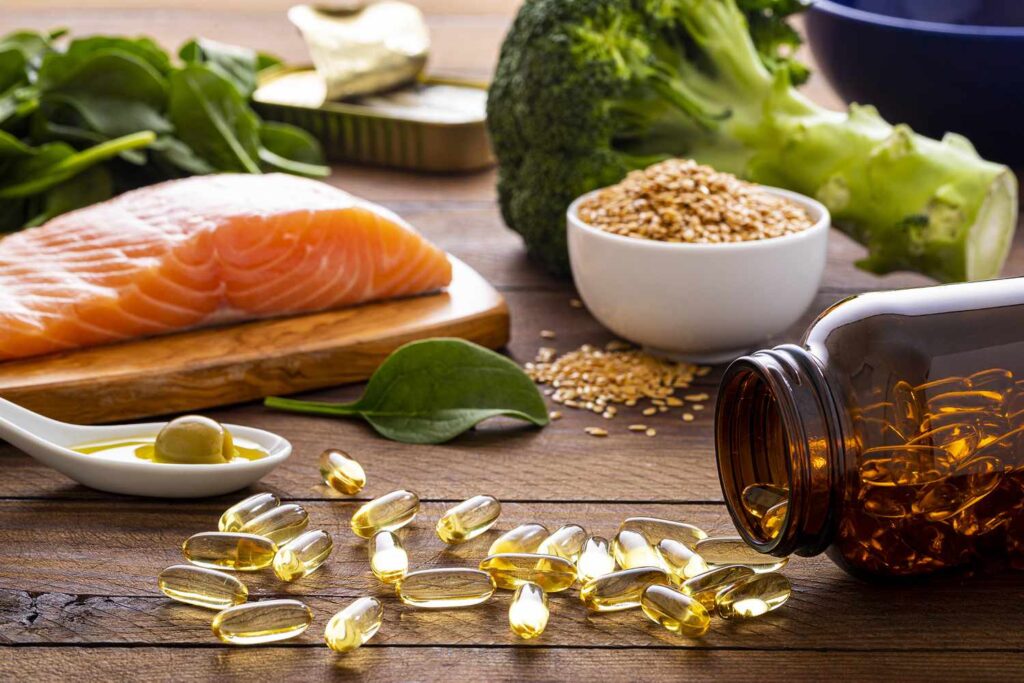
Sources of Omega-3 Fatty Acids
- Fatty Fish: Salmon, mackerel, sardines, and trout are excellent sources of EPA and DHA.
- Plant-Based Sources: Flaxseeds, chia seeds, walnuts, and hemp seeds contain alpha-linolenic acid (ALA), a precursor to EPA and DHA. While ALA is beneficial, the conversion to active forms (EPA and DHA) in the body is limited.
Supplementation and Considerations
- Supplementation: Omega-3 supplements, particularly fish oil capsules containing EPA and DHA, may be considered if dietary intake of these fatty acids is inadequate. However, consulting a healthcare professional is advisable to determine appropriate dosages and potential interactions with other medications.
- Balance and Moderation: While omega-3 fatty acids offer numerous health benefits, excessive intake may lead to complications such as blood thinning. Therefore, maintaining a balanced approach to supplementation is crucial.
Importance of Omega-3s in Acne Management
Omega-3 fatty acids’ anti-inflammatory properties and their potential to counterbalance the pro-inflammatory effects of omega-6 fatty acids make them valuable in managing acne. By reducing inflammation and supporting overall skin health, omega-3 fatty acids may contribute to clearer, healthier skin.
Recommended: Knee To Chest Position In Labor: All You Need To Know
The anti-inflammatory nature of omega-3 fatty acids and their ability to restore balance in the body position them as key components in managing hormonal acne. Whether obtained through the consumption of fatty fish, plant-based sources, or judicious supplementation, harnessing the potential benefits of omega-3 fatty acids can aid in promoting clearer, healthier skin by addressing inflammatory processes associated with acne.
8. Selenium: Antioxidant Support for Skin Health
Selenium, an essential trace mineral, serves as a potent antioxidant within the body. Its role in skin health stems from its ability to combat oxidative stress, which can contribute to acne development. Selenium’s antioxidant properties help neutralize free radicals, potentially reducing inflammation and supporting overall skin wellness.
Antioxidant Properties and Hormonal Balance
- Reduction of Inflammation: Selenium’s antioxidant prowess aids in reducing inflammation within the body, potentially mitigating the inflammatory responses associated with acne development.
- Hormonal Balance: While research is ongoing, some studies suggest that selenium may contribute to hormonal balance by regulating thyroid function and hormone metabolism. This balance may indirectly influence acne development in individuals with hormonal imbalances.

Food Sources and Supplement Suggestions
- Food Sources: Selenium is found in various foods, including Brazil nuts, seafood (such as tuna, and sardines), poultry, eggs, and whole grains. Incorporating these selenium-rich foods into your diet can contribute to overall skin health.
- Supplementation: In cases where dietary intake is insufficient, selenium supplements might be considered. However, it’s essential to consult a healthcare professional to determine appropriate dosages and ensure safe supplementation, as excessive selenium intake can have adverse effects.
Importance of Selenium in Acne Management
While more research is needed to establish a direct link between selenium and acne, its antioxidant properties and potential role in hormonal balance underscore its relevance in skin health. Incorporating selenium through dietary sources or targeted supplementation may aid in supporting healthier skin by combating oxidative stress and potentially contributing to hormonal equilibrium.
Recommended: Top 4 Signs That a Man Has Not Been Sexually Active
Selenium’s antioxidant benefits and potential impact on hormonal balance position it as a valuable element in skin wellness. Whether obtained through a balanced diet rich in selenium sources or supplemented cautiously under professional guidance, leveraging the potential benefits of selenium can aid in promoting clearer, healthier skin by potentially addressing factors associated with acne development.
9. Magnesium: Stress Buster for Skin
Magnesium, an essential mineral involved in numerous bodily functions, plays a vital role in regulating various hormonal pathways. While research specifically linking magnesium to acne is ongoing, its impact on stress reduction and hormone regulation suggests potential benefits for managing hormonal acne.
Stress Reduction and Hormonal Balance
- Stress Management: Magnesium helps regulate the body’s stress response by modulating the hypothalamic-pituitary-adrenal (HPA) axis. Stress is often linked to acne exacerbation, as it can trigger hormonal imbalances that contribute to increased sebum production and inflammation.
- Hormonal Equilibrium: Magnesium influences the production and activity of certain hormones, potentially contributing to hormonal balance. Its role in insulin sensitivity and androgen regulation might indirectly impact acne development in individuals with hormonal imbalances.
Recommended Intake and Dietary Sources
- Recommended Intake: The recommended daily intake of magnesium for adults varies, but it typically ranges from 310-420 mg depending on age and gender. However, individual needs may differ based on factors like stress levels and health conditions.
- Food Sources: Magnesium-rich foods include leafy greens (such as spinach and kale), nuts and seeds (like almonds and pumpkin seeds), whole grains, legumes, and certain fish.
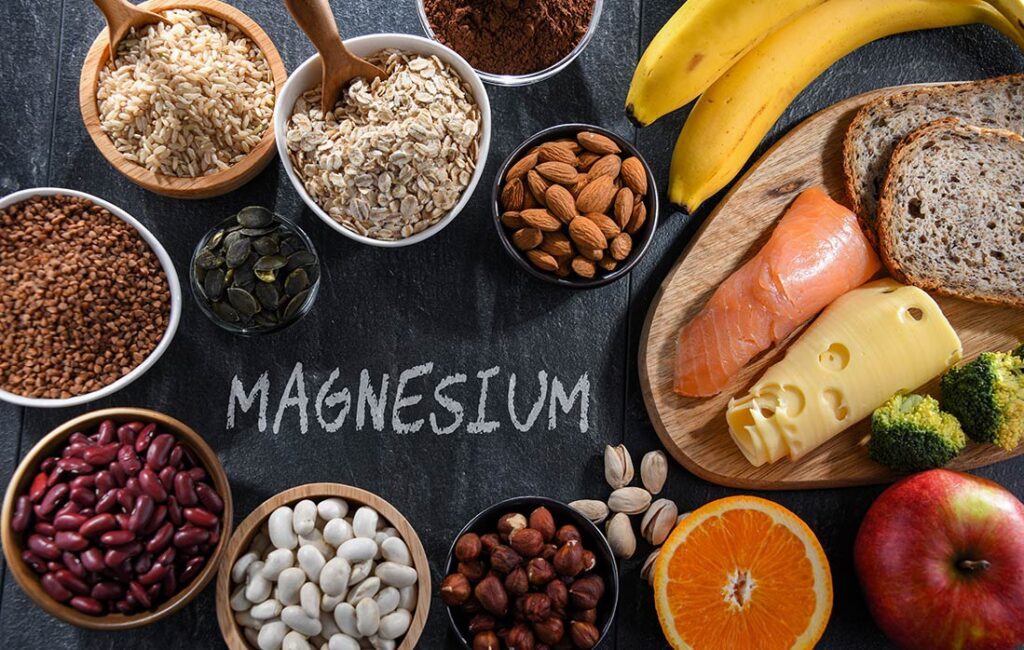
Supplementation and Considerations
- Supplementation: In cases where dietary intake is inadequate or in individuals with specific health conditions affecting magnesium absorption, supplementation might be considered. However, consulting a healthcare professional is crucial to determine the need for supplementation and avoid potential side effects.
- Balancing with Calcium: Maintaining an appropriate balance between magnesium and calcium intake is essential for optimal absorption and utilization of both minerals.
Importance of Magnesium in Acne Management
While direct evidence linking magnesium to acne is still evolving, its role in stress reduction and potential impact on hormonal balance suggest its relevance in managing hormonal acne. Incorporating magnesium through dietary sources or cautious supplementation may contribute to promoting clearer, healthier skin by potentially addressing stress-related factors associated with acne.
Magnesium’s influence on stress reduction and its potential role in hormone regulation position it as a promising element in skin wellness. Whether obtained through a balanced diet rich in magnesium sources or supplemented prudently under professional guidance, harnessing the potential benefits of magnesium can aid in promoting clearer, healthier skin by potentially mitigating stress-related factors associated with acne.
10. Vitamin K2: Skin Clarity Promoter
While often overlooked in discussions about skincare, Vitamin K2 emerges as a silent hero in the pursuit of radiant, blemish-free skin. Renowned primarily for its role in blood clotting and bone health, Vitamin K2 quietly orchestrates a symphony of benefits that extend to the realm of skin wellness.
In the context of skincare, Vitamin K2’s lesser-known but vital function involves aiding in the reduction of skin discoloration and promoting an even skin tone. By supporting the body’s natural healing processes, this vitamin showcases its prowess in fading post-inflammatory hyperpigmentation (PIH), those stubborn marks left behind by acne breakouts. Its ability to regulate blood circulation and minimize the appearance of dark spots and discoloration contributes significantly to achieving skin clarity.
This unsung hero also exhibits potent anti-inflammatory properties, complementing its role in promoting clearer skin. By diminishing redness and calming skin irritation, Vitamin K2 assists in soothing the inflamed patches often accompanying hormonal acne. Its calming influence on the skin helps in alleviating the discomfort and visible effects of acne flare-ups, contributing to a more balanced and harmonious complexion.
Sources of Vitamin K2 aren’t as abundant in the typical Western diet compared to other vitamins. However, fermented foods like natto, cheese, and certain meats constitute natural reservoirs of this nutrient. For those seeking supplemental intake, specific Vitamin K2 supplements are available, offering a convenient means of ensuring adequate levels to support skin health.
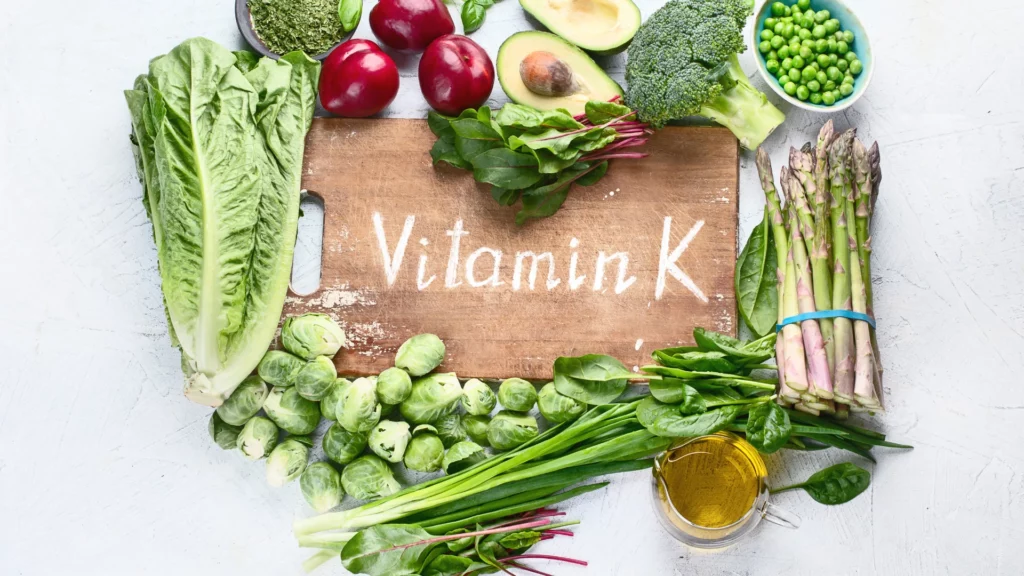
In the context of hormonal acne, Vitamin K2’s contribution to skin clarity should not be underestimated. By targeting discoloration, reducing inflammation, and promoting an even complexion, it stands as an indispensable element in the holistic approach to managing acne-prone skin.
Integrating Vitamin K2 into your skincare regimen, whether through dietary adjustments or supplementation, holds promise as a valuable ally in the journey toward clearer, more radiant skin. While it may not steal the spotlight, its subtle yet significant role in promoting skin clarity solidifies its position among the top vitamins in the quest for healthier, more vibrant skin.
Tips For Managing Hormonal Acne?
Managing hormonal acne involves a combination of skincare, lifestyle adjustments, and sometimes medical interventions. Here are some tips to help manage hormonal acne:
- Gentle Skincare Routine: Use gentle, non-comedogenic cleansers and products suitable for acne-prone skin. Avoid harsh scrubbing or abrasive products that can irritate the skin and exacerbate acne.
- Regular Cleansing: Cleanse your face twice a day to remove excess oil, dirt, and makeup. This helps prevent pore blockages.
- Avoid Touching Your Face: Touching your face can transfer bacteria and irritate existing acne. Try to keep your hands away from your face as much as possible.
- Use Non-Comedogenic Products: Opt for makeup, sunscreen, and skincare products labeled “non-comedogenic” or “oil-free” to minimize pore clogging.
- Healthy Diet: Maintain a balanced diet rich in fruits, vegetables, whole grains, and lean proteins. Limit intake of processed foods, sugars, and dairy, which can sometimes exacerbate acne in some individuals.
- Stay Hydrated: Drink plenty of water to keep your skin hydrated and support overall skin health.
- Manage Stress: Stress can trigger hormonal fluctuations, which may worsen acne. Practice stress-reducing techniques like yoga, meditation, or deep breathing exercises.
- Regular Exercise: Engage in regular physical activity to help regulate hormones and reduce stress. Remember to shower afterward to remove sweat and bacteria from your skin.
- Consult a Dermatologist: If over-the-counter treatments aren’t effective, seek advice from a dermatologist. They can recommend prescription treatments like oral contraceptives, spironolactone, or topical retinoids.
- Consistency is Key: Be patient and consistent with your skincare routine and any prescribed treatments. Hormonal acne management often takes time, and results may not be immediate.
Remember, everyone’s skin is unique, so what works for one person may not work for another. It might take some trial and error to find the most effective regimen for managing hormonal acne. Consulting with a dermatologist can provide personalized guidance and treatment options tailored to your skin’s specific needs.
FAQs
How do vitamins help in managing hormonal acne?
Vitamins play crucial roles in regulating sebum production, reducing inflammation, and supporting skin healing. For instance, Vitamin A regulates sebum, Vitamin E reduces inflammation, and Vitamin C aids collagen production, collectively addressing factors contributing to hormonal acne.
Can I get enough vitamins for hormonal acne through diet alone?
In many cases, a balanced diet rich in fruits, vegetables, whole grains, and lean proteins can provide adequate vitamins. However, supplementation might be necessary for some individuals or when dietary intake falls short.
Are there specific vitamins that directly target hormonal imbalances?
Yes, certain vitamins like Vitamin B Complex (B5, B6, B12) have been linked to hormone regulation. B vitamins can influence hormonal balance, potentially aiding in reducing acne associated with hormonal fluctuations.
Can excessive intake of these vitamins worsen acne or cause side effects?
While vitamins offer skin benefits, excessive intake, especially through supplementation, can lead to adverse effects. It’s crucial to adhere to recommended dosages and consult healthcare professionals to avoid potential side effects.
How long does it take for vitamins to show effects on hormonal acne?
The timeline for noticing improvements in acne can vary. Some individuals might see changes within a few weeks of incorporating vitamins into their routine, while for others, it might take longer. Consistency in intake is key.
Can these vitamins replace traditional acne treatments?
Vitamins can complement acne treatments by addressing underlying factors like inflammation or sebum regulation. However, they might not replace prescribed medications or treatments recommended by dermatologists for severe cases.
Are there any specific vitamins that pregnant or breastfeeding individuals should avoid?
Pregnant or breastfeeding mothers need to consult healthcare providers before supplementing, as certain vitamins, like Vitamin A in high doses, can pose risks to pregnancy. Professional guidance is crucial for safety.
Are there any lifestyle changes that can enhance the effectiveness of these vitamins for hormonal acne?
Yes, maintaining a healthy lifestyle, including proper skincare, a balanced diet, regular exercise, stress management, and adequate hydration, can complement the effects of vitamins in managing hormonal acne.
Can vitamins help with acne scarring caused by hormonal breakouts?
Vitamins like Vitamin E are known for their potential to reduce acne scarring by supporting skin healing and reducing inflammation. However, for severe scarring, dermatological procedures may be necessary.
Should I stop taking my current acne medication if I start using vitamins for hormonal acne?
It’s crucial to consult healthcare providers before making changes to existing medication routines. They can provide guidance on incorporating vitamins alongside current treatments without compromising efficacy.
Conclusion
Harnessing the potential of these vital vitamins and minerals presents a holistic approach to managing hormonal acne. Whether through dietary adjustments or cautious supplementation, optimizing intake of Vitamin A, E, C, D, B Complex, Zinc, Omega-3s, Selenium, and Magnesium offers a promising pathway toward clearer, healthier skin.
Balancing these nutrients and addressing hormonal imbalances can aid in reducing inflammation, regulating sebum production, and supporting overall skin wellness, empowering individuals to take proactive steps toward conquering hormonal acne and fostering skin harmony.
